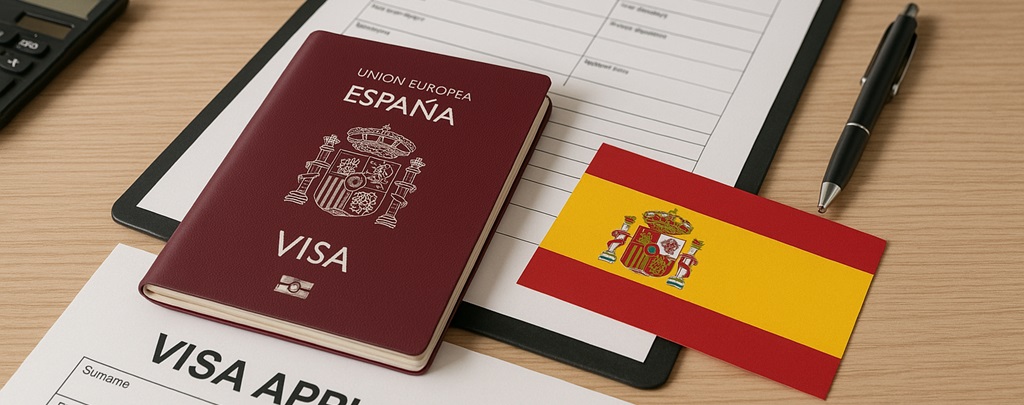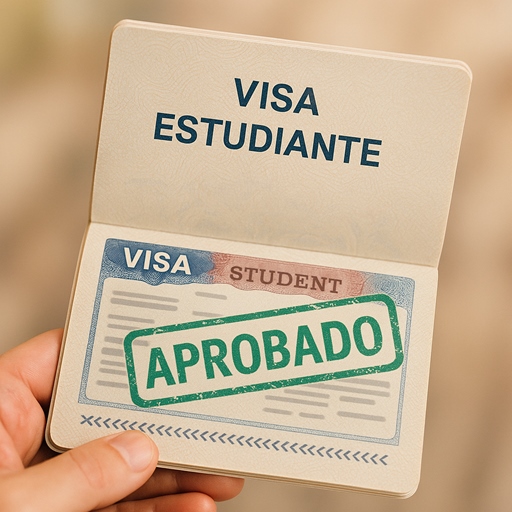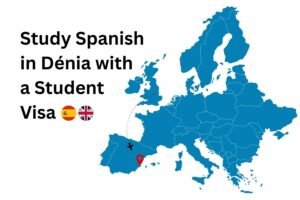
Student Visa in Spain: What you need to know
- Categories SPANISH WITH VISA
- Date 24 July, 2025
If you are planning to study in Spain during 2025, the first crucial step is to arrange your student visa. This permit allows you to legally reside in the country while undertaking recognized studies, and it has evolved in recent years, making it essential to stay up to date with the latest requirements.
1. Updated Guide 2025: How to obtain a student visa for Spain step by step
To begin with, you will need an acceptance letter from an educational institution recognized by the Spanish Ministry of Education. This must specify the duration of the course, the timetable (minimum 20 hours per week), and the type of training. Along with this letter, you are required to submit the duly completed EX-00 form, your valid passport, and a recent passport-sized photograph.
One of the most important aspects of the application is proving that you have sufficient financial means to support yourself during your stay. In 2025, you must demonstrate income equivalent to 100% of the IPREM, which is approximately €600 per month or €7.200 per year over 12 payments. This can be evidenced through bank statements, a legalized family sponsorship letter, or documents confirming the award of an official scholarship.

You will also need private health insurance with no co-payments, providing full coverage throughout Spain with a minimum of €30.000 for emergencies, hospitalization, and repatriation. This requirement is a common reason for visa refusals if not presented correctly.
According to FEDELE, courses exceeding 90 days require a type D visa, which enables you to apply for a Foreigner Identity Card (TIE) and also allows you to work up to 30 hours per week, provided it does not interfere with your studies. It is important to ensure these 30 hours are fully approved for all levels of study. For courses up to 90 days, a Schengen type C visa applies, which does not permit work or the issuance of a TIE.
A relevant point is attendance control: centers are obliged to monitor student attendance and report to Immigration if three unjustified absences are accumulated, something many people are unaware of, which can have serious consequences for visa validity.
Finally, remember that you can submit your application up to 90 days before the start of the course. The process usually takes between 15 and 30 days, although according to FEDELE, some consulates recommend applying between 31 and 120 days before your course begins. Additionally, if you are in Spain on a Schengen visa, in certain cases you may initiate the procedure from within the country, as we will see later.
Remember:
• The student visa allows you to reside in Spain for recognized studies, with updated requirements for 2025.
• An acceptance letter is needed detailing the course, accommodation, and payment of 80–100% of the course fees.
• You must submit the EX-00 form, valid passport, and recent photo.
• You need to demonstrate minimum income of €600 per month (100% IPREM), with greater flexibility in acceptable documents
• Private health insurance with no co-payment is mandatory, with full coverage and at least €30.000 for emergencies.
• For stays longer than six months, a medical certificate and apostilled criminal record are required.
• Applications can be submitted up to 90 days before the course, processing takes 15–30 days (ideally apply 31–120 days in advance).
• In some cases, you can begin the process from Spain with a Schengen visa.
• The type D visa allows work up to 30 hours per week and access to the TIE.
• Centers must monitor 100% attendance and report unjustified absences.
2. Student visa in Spain: changes in immigration law you should know (2024–2025)
FEDELE has highlighted certain critical aspects of the reform. For example, the limit on the permitted holiday period, which cannot exceed 10% of the course duration. They have also expressed concern about the exclusion of under-18s from the student visa scheme, a measure that could leave young students in accredited programs without a permit.
Another key reform is the duration of the residence permit. Granting for the entire study period is now subject to the consulate’s decision and the documents provided. This removes the need for annual renewals, which previously caused significant administrative difficulties for long-term students.
Additionally, the possibility of starting the visa process from within Spain has been expanded. This option is only available for certain educational levels under specific conditions (for example, higher vocational training or university studies). It is not valid for general or non-regulated Spanish language courses.

3. How many hours can you work with a student visa in Spain after the legal changes?
The new regulations have brought good news for international students: it is now possible to work up to 30 hours per week without modifying the visa. This applies to both employment and self-employment, provided it does not interfere with academic schedules.
It is important to note that this work permit does not require a separate application if the visa has been granted under the new law. However, the employment contract must be properly registered, and the employer must ensure the job is compatible with your studies.
4. Visa from your home country vs. visa application in Spain: which is better?
There are now two possible routes to obtain a student visa: applying from your home country or processing it directly in Spain. Each has its advantages and limitations.
Applying from your home country remains the most traditional route. It offers a clear structure, allowing you to enter Spain with everything in order, including the visa stamped in your passport. This option is especially advisable for those undertaking short programs or who do not meet the requirements to apply within Spain.
On the other hand, you may apply for a student visa in Spain as a tourist. This is only available for certain educational levels and under specific conditions (for example, higher vocational training or university studies). It is not valid for general or non-regulated Spanish language courses.
In any case, both options require the same documentation, proof of financial means, and health insurance. The difference lies mainly in the logistics and flexibility each route offers.
5. Common mistakes when applying for a student visa for Spain and how to avoid them
One of the most frequent reasons for student visa refusals is incorrect documentation submission. Many applicants make the mistake of providing health insurance policies that do not meet legal requirements or include co-payments, which automatically invalidates them.
Another common error is failing to translate or apostille criminal record or medical certificates correctly. Authorities are very strict on this point, and any inconsistency can result in rejection.
Underestimating the time needed to gather documents is also common. Applying with only a few days before the course start date can jeopardize your admission or arrival in Spain.
Finally, some students are unaware of legal work limits and exceed the maximum hours allowed, leading to sanctions or loss of student status.
The best recommendation is to consult official sources, prepare documents in advance, and, if possible, seek advice from immigration experts.

6. What health insurance policies are valid for a student visa in Spain?
Health insurance for a student visa is mandatory. In 2025, Spanish authorities require the insurance to be private, with no co-payments or waiting periods, providing full coverage nationwide and valid for the entire duration of your stay.
It must specifically include coverage for medical emergencies, hospitalization, and repatriation, with a minimum guarantee of €30,000. Traditional travel insurance or policies with deductible or territorial limitations are not accepted. When purchasing insurance, ensure the contract clearly states its duration, coverage, and that it is signed by both sides.
This document is carefully assessed by consulates, so it must be submitted in its original form, translated into Spanish if in another language, and, in some cases, apostilled.
7. Why is studying Spanish in Denia a good option for international students?
Studying Spanish at TLCdénia is much more than learning a language: it is a complete life experience. Our city, a jewel on the Alicante coast, offers the perfect balance of quality of life, natural beauty, and opportunities for personal and academic growth.
Denia has it all: stunning beaches, year-round sunshine, and a wide range of outdoor activities. This is complemented by a vibrant cultural life, festivals, UNESCO-recognized gastronomy, and a relaxed atmosphere that facilitates full immersion in Spanish.
Each year we welcome students from around the world who choose Denia for its international environment, excellent location between Valencia and Alicante, and schools like ours, where we offer accredited programs adapted to student visa requirements.
Unlike larger cities, studying spanish in Denia allows closer integration with the local community, lower living costs, and a calm, accessible environment. It is the ideal place to focus on learning Spanish while enjoying Mediterranean life.
8. Real stories: what is it like to live and study Spanish in Spain with a student visa
At TLCdénia, we have supported students from around the world on a journey that transforms not only their Spanish level but also their academic, personal, and professional lives.
Over the years, we have seen our students make the most of their time in Spain: with Spanish Intensive Course, gaining experience, and confidently adapting to a new culture thanks to the family-like environment and personalized attention we offer.
Many have even extended their stay in the country due to legal changes allowing them to apply for work permits after completing their studies.
These experiences show that coming to study Spanish in Denia with a visa, is not just an academic decision: it is a real opportunity to grow, build connections, and open new doors. At TLCdénia, we are proud to be part of this process and to support each student along the way.
9. Cost of living for international students in Spain in 2025: accommodation, food, leisure, and transport
Careful budgeting is key to studying in Spain with peace of mind. In 2025, the cost of living for international students in medium-sized cities like Denia is more affordable than in major capitals.
Accommodation costs vary depending on the type (residence, shared flat, or host family). Sharing a flat is the most common and economical option.
Leisure activities such as cinema, excursions, sports, or festivals can fit various budgets, with many free or low-cost options available.

10. What type of accommodation is best for international students in Denia?
At TLCdénia, we know good accommodation makes all the difference to your experience in Spain. That is why we offer personalized guidance to find the ideal option that meets visa requirements.
In Denia, you can choose to live with a host family, ideal for full cultural and linguistic immersion, or in shared flats, perfect for those seeking greater independence and connection with other students.
11. Can I bring my family with my student visa? Requirements for accompanying relatives
One of the most common questions among international students is whether they can bring their family during their stay. The answer is yes: the student visa allows family reunification in certain cases. However, not all consulates accept joint applications.
You can apply for a residence permit for your spouse, registered partner, or minor children, provided you prove sufficient financial means to cover their living costs, accommodation, and health insurance.
You must demonstrate additional income (approximately 75% of IPREM for the first relative and 50% for each additional family member), as well as provide private health insurance for each accompanying person.
It is important to note that this application can be submitted simultaneously with the student visa or afterwards, once it has been granted. The procedure must be managed at the competent Immigration Office or the relevant consulate.
Accompanying relatives are not permitted to work in Spain unless they obtain their own permit. However, they can reside legally, access healthcare services, and, in the case of children, enroll in school without restrictions.

You may also like

Student Visa to learn Spanish in Spain for U.S. Citizens


